G20 Labour and Employment Ministers’ meeting finalizes the text of Labour and Employment track.
The text emphasizes creating formal jobs and promoting decent work as the most effective social tools for achieving a fairer and more equitable income
Smt. Karandlaje stresses the need for skilling and reskilling to ensure just and fair transition to greener alternatives.
Union Minister of State for Labour & Employment outlines India’s achievement in leveraging technology as a means of improving everyone’s quality of life
The G20 Labour and Employment Ministers’ (LEMM) assembled in Fortaleza, Brazil have approved the Labour and Employment Ministerial declaration on 26th July, 2024. The final text was approved after the conclusion of the two-day long Labour & Employment Ministers´ meeting (LEMM) on 25-26 July, under the Presidency of Brazil.
Indian delegation was led by Minister of State for Labour & Employment Smt. Shobha Karandlaje. Brazil along with India and South Africa, the previous and the next host of the G20, were members of troika. The Labour & Employment Ministers’ meeting was preceded by 5th Employment Working Group meeting (EWG) on 23-24 July, which negotiated the final text.
During the two-day Labour & Employment ministers made interventions on key focus areas of the Labour & Employment track, viz. Just Transition; the creation of quality jobs and the promotion of decent work to ensure social inclusion and eliminate poverty and hunger; Gender Equality and the promotion of diversity in the world of work; and the use of technologies as a means of improving everyone´s quality of life.
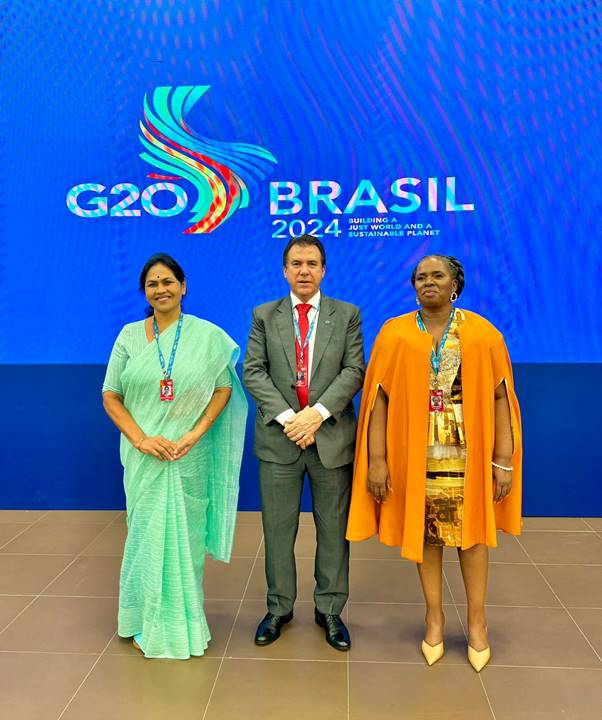
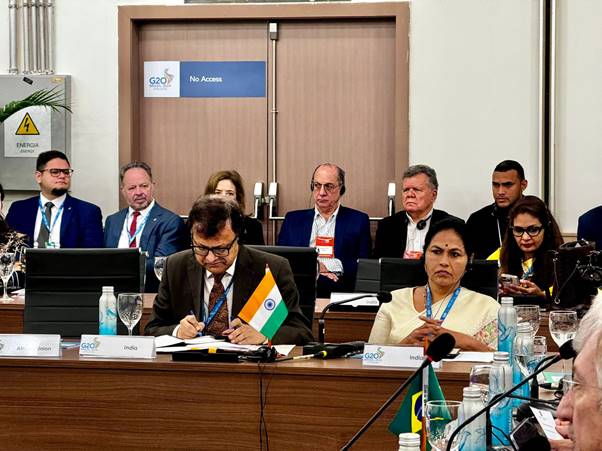
The declaration emphasizes the need for governments to develop and support active inclusion policies aimed at fostering strong, sustainable, balanced and inclusive economic growth. It recognizes that creating formal jobs and promoting decent work are the most effective social tools for achieving a fairer and more equitable income distribution. The declaration also stresses the need to create and promote decent work and deliver effective labour market policies, such as skills development, access to training and lifelong learning and job matching, aligned with the skills needs and demands of the economy and in consultation with social partners. It also urges the governments to have policy measures to formalize jobs, to appropriately respond to platform work, to promote adequate levels of wage floors, to provide access to adequate social protection and the promotion of social dialogue and collective bargaining.
In her opening remarks in the session on ‘Just Transitions’ in the Labour & Employment Ministers meeting, Smt Karandlaje emphasized the need for skilling and reskilling to ensure just and fair transition to greener alternatives. “Just transitions encompass various dimensions, including protecting workers and communities affected by the phasing out of carbon-intensive industries. It requires a robust framework of social protection, retraining programs, and investments in sustainable industries. However, the shift to greener alternatives can lead to significant job losses and economic instability if not managed carefully”, Smt Karandlaje said.
Union Minister said that India had created National Missions in specific areas such as solar energy, energy efficiency, water, sustainable agriculture, health, the Himalayan ecosystem, sustainable habitat, green India, and strategic knowledge for climate change. She also said that Sector Skill Council for Green Jobs (SSCGJ) are playing a crucial role in developing a skilled workforce for the related sectors.
During the intervention in her session on ‘Creation of Quality Jobs and the Promotion of Decent Work Jobs to Ensure Social Inclusion and Eliminate Poverty and Hunger’, Smt. Karandlaje informed that India has generated over 80 million employment opportunities from 2017-18 to 2021-22, averaging over 20 million jobs per year and the youth unemployment rate has dropped from 17.8% in 2017-18 to 10% in 2022-23, with increased youth participation in the labour force. She also said that India’s 'One Nation, One Ration Card' initiative allows migrant workers to access entitled food grains nationwide. In addition, the Ayushman Bharat Scheme, the world's largest government-funded healthcare program, covers over 550 million citizens, demonstrating our dedication to health security, she added.
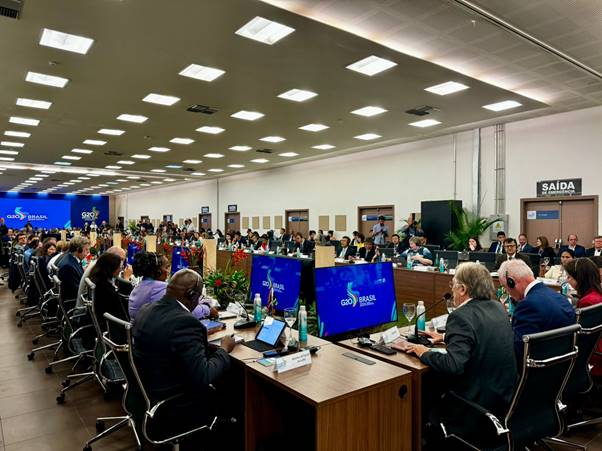
During the intervention on 'Gender Equality and Promotion of Diversity in the World of Work’, Union Minister Minister said that India has made has made significant strides in promoting gender equality at workplace through robust legislative measures. “The Sexual Harassment of Women at Workplace (Prevention, Prohibition, and Redressal) Act, 2013, outlines strict procedures ensuring a safer work environment for women. Further, the Equal Remuneration Act, 1976, mandates equal pay for men and women performing the same work or work of a similar nature. Another significant step is extending paid maternity leave from 12 weeks to 26 weeks for women employees, applicable to both public and private sectors”, she said.
During the session on ‘The Use of Technologies as a Means of Improving Everyone’s Quality of Life’, Smt Karandlaje said that India has leveraged digital platforms through ‘Digital India Mission’ to open up new avenues for entrepreneurship and employment. “Government of India launched e-Shram portal in 2021 with the objective to create a national database of all unorganised workers including Construction Workers, Gig and Platform workers, Street Vendors, Domestic Workers, Migrant workers etc., seeded with unique identification number i.e. Aadhaar. More than 298 million informal sector workers have registered on the portal so far. This is being linked to Skill India digital portal to make skilling opportunities accessible to the workers in the informal sector”, she informed the gathering. Smt Karandlaje also said that Aadhaar, one of the world's largest biometric ID systems, has facilitated financial inclusion by enabling millions to open bank accounts and access direct benefit transfers. However, the Minister urged the G20 countries to address the ethical considerations that come with technology. She said that issues related to data privacy, cybersecurity, and the ethical use of AI must be addressed through robust regulatory frameworks and international cooperation.
On the sidelines of the meeting, Union Minister of State for Labour and Employment Smt Shobha Karandlaje met Mr. Gilbert Houngbo, Director General of International Labour Organization (ILO).
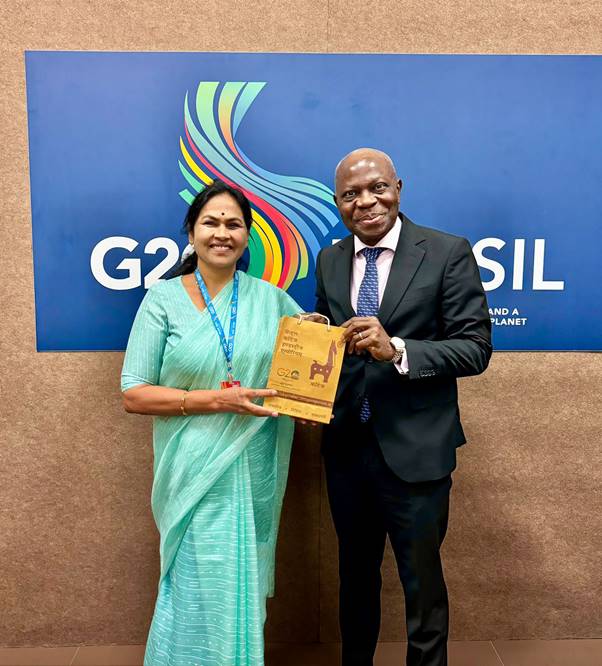
She also met Japanese State Minister for Health, Labour and Welfare Mr. Miyazaki Masahisa on the sidelines of G20 Labour & Employment Ministers meeting at Fortaleza, Brazil. The two leaders discussed areas of mutual interest including the need to further enhance the mobility of semi-skilled and skilled workers from India to Japan.
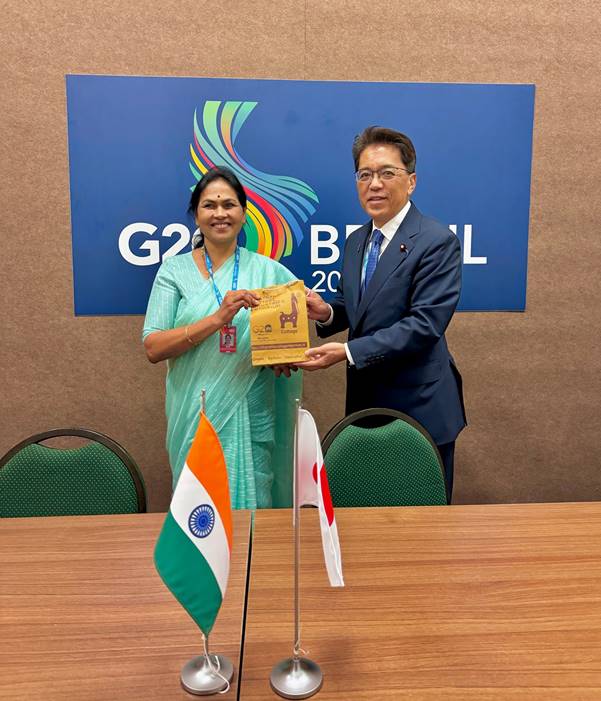



addComments
Post a Comment